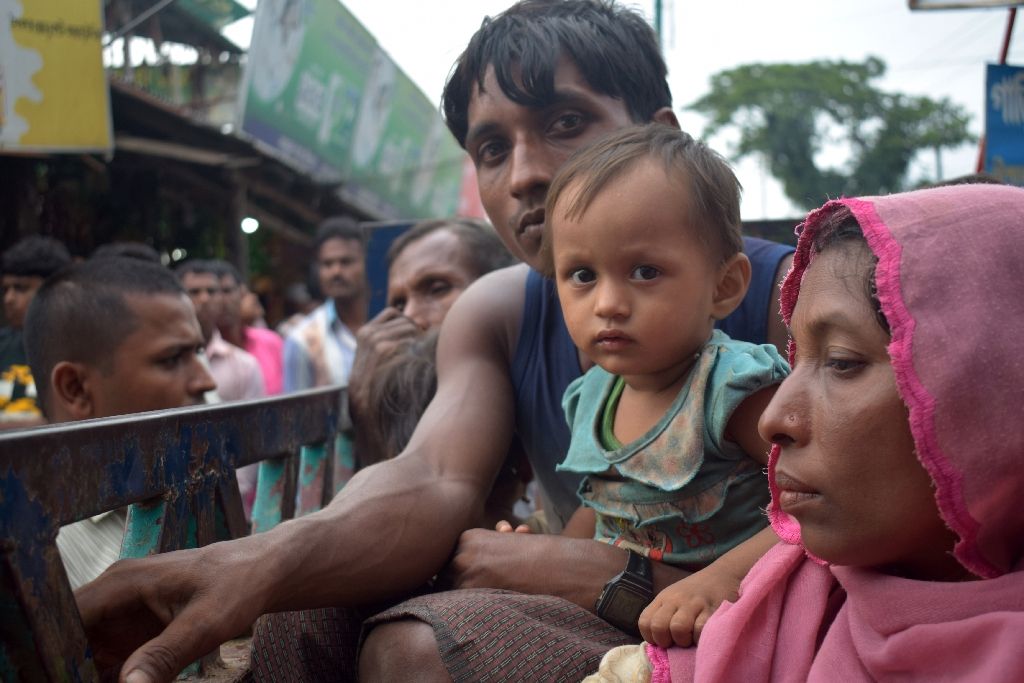The UN human rights chief urged on Monday the government of Myanmar to end its “cruel military operation” against the country’s Muslim Rohingya minority.
Zeid Ra’ad al-Hussein, addressing the United Nations Human Rights Council in Geneva, said that more than 270,000 people had fled to Bangladesh, adding: “The situation seems a textbook example of ethnic cleansing.”
More refugees are trapped on the border, amid reports of the burning of villages and extrajudicial killings.
He said that Myanmar’s “brutal security operation” against Rohingyas in Rakhine state was “clearly disproportionate” to insurgent attacks carried out last month.
He pointed to satellite imagery and reports of “security forces and local militia burning Rohingya villages” and extrajudicial killings.
He said that he was “further appalled” by reports of Myanmar authorities planting land mines along the border.
“The Myanmar government should stop pretending that the Rohingya are setting fire to their own homes and laying waste to their own villages,” he added, calling it a “complete denial of reality” that hurts the standing of a country that recently enjoyed “immense good will.”
“I call on the government to end its current cruel military operation, with accountability for all violations that have occurred, and to reverse the pattern of severe and widespread discrimination against the Rohingya population,” Zeid demanded.
Earlier, the Bangladesh government said it has offered a plot of land for a new camp to shelter Rohingya Muslims who have fled Myanmar.
The violence has driven nearly 300,000 Rohingya to flee Buddhist-majority Myanmar, with many of them packed into existing camps or huddled in makeshift settlements that have mushroomed along roadsides and in open fields across Cox’s Bazar district on the border.
Bangladesh’s junior Foreign Minister Mohammed Shahriar Alam said Prime Minister Sheikh Hasina had 2,000 acres (810 hectares) near the existing camp of Kutupalong “to build temporary shelters for the Rohingya newcomers,” according to a message posted Monday on his Facebook account.
He also said the government would be registering the new arrivals on Monday. Hasina is scheduled to visit Rohingya refugees on Tuesday.
Aid agencies have been overwhelmed by the influx of Rohingya, many of whom are arriving hungry and traumatized after walking days through jungles or packing into rickety wooden boats in search of safety in Bangladesh.
Many tell similar stories — of Myanmar soldiers firing indiscriminately on their villages, burning their homes and warning them to leave or to die. Some say they were attacked by Buddhist mobs.
The government hospital in Cox’s Bazar has been overwhelmed by Rohingya patients, with 80 arriving in the last two weeks suffering gunshot wounds as well as bad infections. At least three have been wounded in land mine blasts, and dozens have drowned when boats capsized during sea crossings.
Rohingya have faced decades of discrimination and persecution in Myanmar and are denied citizenship despite centuries-old roots in the Rakhine region. Myanmar denies Rohingya exist as an ethnic group and says those living in Rakhine are illegal migrants from Bangladesh.
Meanwhile, the Dalai Lama stated that the suffering of Rohingya Muslims would have inspired Buddha to help.
The Tibetan Buddhist spiritual leader said those who are harassing Muslims “should remember Buddha. I think such circumstances Buddha would definitely help to those poor Muslims.”
The Dalai Lama said he had also delivered this message to Myanmar’s leader Aung San Suu Kyi several years ago at a meeting of Nobel Peace Prize laureates.
He told reporters Saturday that the situation in Buddhist-majority Myanmar made him “very sad.” The comments were captured on video at the airport in the Indian hill town of Dharamsala, where he has lived in exile for decades.
While Burmese Buddhists in Myanmar also worship the Buddha, they follow a different religious tradition than Tibetans and do not recognize the Dalai Lama as their spiritual leader.
